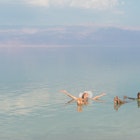
Dec 13, 2024 тЂ 9 min read

Nov 30, 2023 тЂ 7 min read

From staying safe to understanding local etiquette, this guide to Jordan for first-timers will help you plan the perfect trip ТЉ Stefan Tomic / Getty Images
A small country that's big on hospitality, ancient history and culture т with numerous UNESCO World Heritage sites т Jordan offers endless opportunities for adventure.
From afar, itтs often unfairly lumped in with regional conflict and, as such, overlooked by wary travelers. But in reality, itтs a welcoming and peaceful destination not to be missed.
Start planning the trip of your life today with our ten top tips for first-time visitors to Jordan.

Despite being located in a region with a history of conflict, Jordan is a friendly oasis thatтs open and inviting to visitors. Hospitality reigns supreme, violent crime is extremely rare, and ranks Jordan in the top ten for countries where people feel safe walking alone at night.
While you should take the usual precautions you would anywhere т purchase travel and health insurance, donтt carry large sums of cash, and keep valuables locked in a safe т fear should not be a factor when planning a trip to Jordan.
Donтt let the "Jordanian frown" fool you. Although you may be met with furrowed brows and what appear to be unfriendly faces, youтll quickly learn just beneath the tough exterior of a resting frown face typically lies a fun-loving attitude and a deeply rooted tradition of hospitality that can be traced back to Bedouin culture.
Itтs not uncommon to be invited for tea or even a meal by shopkeepers and strangers you meet. "Ahlan wa sahlan'" (welcome), locals will say. "Where are you from? Welcome to Jordan."

Youтll see people of the same gender greet each other with handshakes, hugs and even multiple air kisses beside each cheek. But if you put your hand out for a shake or lean in for a hug, you may be left hanging.
Out of respect for their religion and spouse, some Muslims will not touch people of a different gender unless they are related by blood. Donтt take it personally т be prepared and open to learning the local traditions.
When meeting someone, you can stand, say hello, smile and then let them take the lead. If they extend a hand or lean in for a hug, you can do the same. If they keep their hands at their sides or put their right hand over their heart rather than reaching out, thatтs their way of acknowledging you.
A common misconception about Jordan is that itтs always hot, dry and sunny. While that may be the case if you visit between May and September, Jordan does have a winter season.
From November to February, the country receives a great deal of cold and cloudy days, rain and even snow, sleet and hail on occasion. Temperatures can hover under 10ТКC (50ТКF) during the day and drop to freezing in the night (32ТКF).
If youтre traveling from mid-October to mid-March, be sure to pack a waterproof jacket and warm layers and monitor the weather. Flash floods are extremely dangerous, and even Petra is known to close during inclement weather.

If youтre in search of sundowners, you can find alcohol at a number of restaurants, bars and, of course, liquor stores in the larger cities like Amman and Aqaba, as well as Christian towns such as Madaba and Fuheis (where youтll find Carakale, Jordanтs first and only craft beer microbrewery).
St George and Jordan River also produce their own wine in the country but be prepared to pay a pretty penny for your libations т although legal, alcohol tends to carry hefty taxes.
Bear in mind that Muslim-owned properties and Islamic holidays may affect how readily alcohol is available. For example, itтs illegal to sell alcohol anywhere in the country during Ramadan (with the exception of some high-end hotels), and most camps in Wadi Rum donтt serve alcohol at all (but you can often bring your own).
Call ahead to inquire about availability and any restrictions, and if you do drink, be mindful of your hosts and consume in moderation.
Jordan is a Muslim-majority country, but Christians, Jews and people of various beliefs also coexist peacefully here. There is no law requiring women to wear hijab, but there is an expectation that visitors dress respectfully т itтs best to avoid low-cut and shoulder-baring tops, short skirts, and shorts.
If you plan to visit a place of worship, both men and women must cover their knees and shoulders, and women are typically expected to cover their hair, chest and neck.
But covering up doesnтt mean dressing down: Jordanians are generally quite image-conscious and well-dressed. Some restaurants even enforce a sophisticated dress code, particularly in Amman.
Keep that in mind when packing and feel free to flaunt your personal style (respectfully) if youтll be spending time in the capital.
YouTube video player
Alcohol may be in somewhat short supply, but there is argeeleh (shisha) aplenty. For better or worse, smoking shisha is a national pastime, and youтll find argeeleh cafes across the country. Cigarette smoking is also widely accepted т although it is banned in numerous indoor public spaces, the bans are often ignored by locals.
Travelers who smoke will be in good company, but the smoking culture in Jordan can prove challenging for nonsmokers and those with health conditions. When booking rooms, tours, restaurants and transportation, ask whether non-smoking options are available.
Tap water is usually not drinkable in Jordan, though some higher-end hotels have their own water purification systems. Environmental education and recycling facilities are scarce, and you will see plastics and other rubbish littering the otherwise lovely landscapes.
Local businesses and organizations with an eco-aware approach and plastic-free policies like those of , the Jordan Trail and are working to teach and inspire locals and visitors with their environmental initiatives.
Travelers to Jordan can be part of the solution by supporting these businesses and carrying their own reusable filtration water bottles (such as ) and reusable utensils.

Jordan is smaller than Portugal or the US state of Maine, but within its borders, youтll find endless adventure possibilities, ancient history and culture, nature reserves, and community-based immersive experiences (such as those provided by , and ).
There are also five UNESCO World Heritage Sites, including the architectural wonders of Petra and the expansive deserts and towering rocks of Wadi Rum.
If youтre eligible for a visa on arrival to Jordan, purchase the Jordan Pass to gain entrance to some of the best sites, castles and museums including Petra, Wadi Rum, the Temple of Hercules in Amman, the Roman ruins at Jerash and Ajloun Castle.
Keep in mind that although Jordan is small in size, the terrain is varied, roads may be rough and traffic can delay your plans. Traveling to sites may take more time than you anticipate, so plan accordingly and try not to schedule every moment of your itinerary. Immerse yourself in the experiences and allow time for the unexpected.
Maybe it will be the moment you fall asleep under a blanket of stars or stand in awe of enormous ancient stones. Or perhaps it will hit you when you reach the peak of a mountain and take in the view, far away from the rush of the city.
It might be the laughter and stories you share with your new Bedouin friends. Or the taste of tea brewed with sage and sugar over a campfire. It could be in the fresh mansaf (the Jordanian national dish of lamb, rice and yogurt sauce) made with love by your hosts and eaten with your hands. Or it could be when you hear the muezzinтs call to prayer while watching birds dive and swoop against a sunset sky.
There will be a moment т or more likely, many moments т when the magic of Jordan seeps into your soul. Jordan will welcome you, challenge you and it may very well change you. And youтll find yourself making plans for your next trip before you even finish your first.


Dec 13, 2024 тЂ 9 min read







